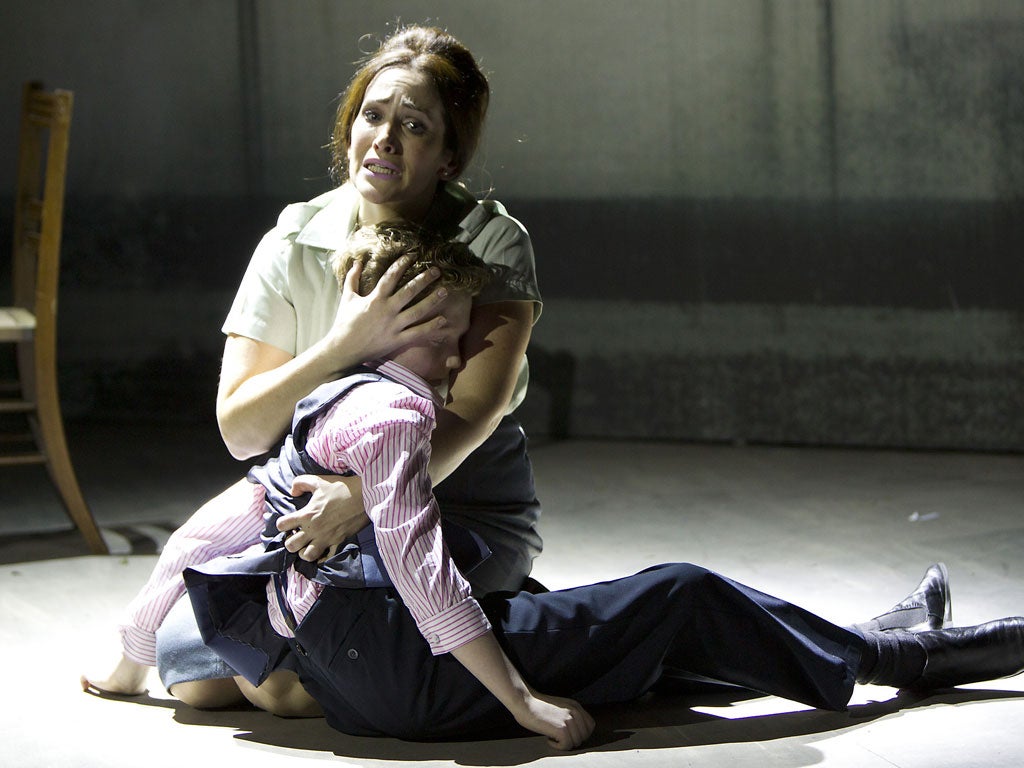The Turn of the Screw, The Mill, Newtown Abbey Surrogate Cities, Royal Festival Hall, London Budapest Festival Orchestra, Royal Festival Hall, London
This first-rate spine-chiller notches up another hit production for the fledgling Northern Ireland Opera

Your support helps us to tell the story
From reproductive rights to climate change to Big Tech, The Independent is on the ground when the story is developing. Whether it's investigating the financials of Elon Musk's pro-Trump PAC or producing our latest documentary, 'The A Word', which shines a light on the American women fighting for reproductive rights, we know how important it is to parse out the facts from the messaging.
At such a critical moment in US history, we need reporters on the ground. Your donation allows us to keep sending journalists to speak to both sides of the story.
The Independent is trusted by Americans across the entire political spectrum. And unlike many other quality news outlets, we choose not to lock Americans out of our reporting and analysis with paywalls. We believe quality journalism should be available to everyone, paid for by those who can afford it.
Your support makes all the difference.Constructed as a series of variations, Benjamin Britten's 1954 chamber opera The Turn of the Screw is an enigma. The narrator of the Prologue is conspicuously detached from the story, his witnesses unreliable: a halfwit house-keeper, a hysterical governess, two traumatised children and two ghostly predators whose crimes are couched in innuendo. Time blurs in the opera, the decorative trappings of a Victorian, Edwardian or mid 20th-century country house fading from view. Most unnervingly, there is a sense that the turning does not end with the performance, that the circling 12-note theme continues, unheard.
Oliver Mears's production for Northern Ireland Opera takes adolescence as its focal point, setting the work in the period of its composition, when the teenager was emerging as a social phenomenon and young women of slender means had to find a husband promptly or risk stigmatisation as fast girls of the type portrayed by Diana Dors. In the labyrinthine corridors of Bly – a series of noiselessly gliding panels designed by Annemarie Woods – we see Miles (Thomas Copeland) and Flora (Lucia Vernon) exchange the knickers and smocks of 1950s childhood for the uniform of young adulthood. Rebellion is in the air: in Flora's sinister games with her doll, in the crazy-mirror scales and arpeggios of Miles's piano practice, and the children's crowing perversion of the Te Deum. Meanwhile, the Governess (Fiona Murphy) struggles to suppress her own sexual curiosity, dreaming the Act II encounter between Quint (Andrew Tortise) and Miss Jessel (Giselle Allen) from a tangled bed. Charged with doing nothing to disturb her employer, she continues to do nothing, cheered on by Yvonne Howard's doughty Mrs Grose.
In an opera that is notable for its understatement, Mears leaves open the question of Jessel and Quint's corp-oreality, playing instead with details of language. This is a first-rate cast, with first-rate diction, from the bright chimes of the two children to the coagulated moans of Allen's Jessel, Tortise's clipped Narrator and sarcastic Quint, Howard's fretful clucking and Murphy's incendiary unravelling. In the pit, Nicholas Chalmers foregrounds the percussion under glassy strings and hallucinogenic blooms of colour from the wind. It's a Screw any company would be proud to tour. From a company that is barely a year old, it's remarkable.
Music Nation, Radio 3's country-wide "cultural countdown" to the 2012 Olympics, offered a mixed portrait of musical Britain, performed live in different locations. While Glasgow dumbed down to the theme music from Chariots of Fire, London brained up on the fractured narratives of Heiner Goebbels' Surrogate Cities, performed by the Trinity Laban Symphony Orchestra. Under Jonathan Stockhammer, this 1994 A-Z of real and imagined urban landscapes sounded slick and dangerous, a polyglot, film-noir fantasy of smoky dives, dusty synagogues, Varèse-inspired monsters of metal and concrete, and wild-eyed strangers. Surrogate Cities is a lament and an aubade: crooned, shrieked and growled in the kinetic vocalism of David Moss and the sultry keening of Jocelyn B Smith. For those wanting more Goebbels, Birmingham Conservatoire has a festival of his work starting on 19 March, while Up-River Book, the piece he created at the Southbank Centre last week, can be heard online now (aroomforlondon.co.uk).
Ivan Fischer and the Budapest Festival Orchestra offered a foretaste of summer in last weekend's all-lollipop programme with Renaud Capuçon. If this ensemble has a defining characteristic, other than the intensity of its bowing and the sweetness of its wind and brass, it is the ability to transform preconceptions. Under Fischer's direction, Brahms becomes a radical sensualist, Rimsky-Korsakov a miniaturist, Lalo an introvert. This was a Tragic Overture that pressed its palm to the small of your back, a Scheherazade of extraordinary delicacy, and a Symphonie espagnole of aching melancholy. The spell extended to Capuçon, whose habitually flawless playing acquired new darkness and virility.
'The Turn of the Screw' (028-9038 5673) Lyric Theatre, Belfast, 20 Mar
Classical choice
Renaud Capuçon, the Guildhall Chamber Ensemble and the BBC Symphony Orchestra celebrate Australia's leading composer in Total Immerson: Brett Dean at London's Barbican Centre (Sat). David McVicar returns to Scottish Opera with a new production of Stravinsky's The Rake's Progress, Theatre Royal, Glasgow (from Sat).
Join our commenting forum
Join thought-provoking conversations, follow other Independent readers and see their replies
Comments